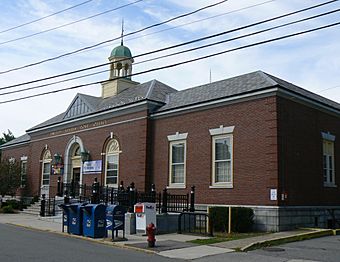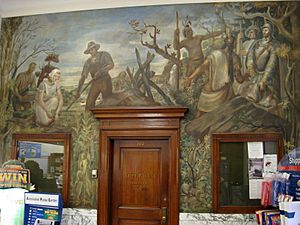United States Post Office (Arlington, Massachusetts) facts for kids
|
U.S. Post Office-Arlington Main
|
|
|
U.S. Historic district
Contributing property |
|

A photo of the building, taken in 2008
|
|
| Location | 10 Court Street, Arlington, Massachusetts |
|---|---|
| Built | 1935 |
| Architect | Maurice P. Meade |
| Architectural style | Colonial Revival |
| Part of | Arlington Center Historic District (ID85002691) |
| NRHP reference No. | 86001351 |
Quick facts for kids Significant dates |
|
| Added to NRHP | June 18, 1986 |
| Designated CP | September 27, 1985 |
The United States Post Office—Arlington Main is a special old building in Arlington, Massachusetts. It was built in 1936. This building has a cool design called Colonial Revival. The most interesting part is a large painting, or mural, inside. This mural was painted in 1938 by an artist named William C. Palmer. He got help from a government program called the Federal Art Project.
This post office is important because it's listed on the National Register of Historic Places. This happened in 1986. Before that, in 1985, it became part of the Arlington Center Historic District. This means it's a protected historical site.
What Does the Arlington Post Office Look Like?
The Arlington Post Office is on the west side of Court Street. This is a small street just north of Massachusetts Avenue in the center of Arlington. It's a one-story building made of brick. It has a sloped roof with an eight-sided tower on top. This tower is called a cupola.
The middle part of the building sticks out a little. It has three arched openings. The middle arch has special stone trim around it. This is where the main entrance is. A small roof section was added above the entrance. This helps keep rainwater away from the door. This post office is a bit bigger than other post offices built for smaller towns at that time.
Inside the Post Office: A Look Around
When you go inside, the postmaster's office is on the right. The area where people pick up their mail from boxes is on the left. The service counters are in the middle. Behind them is the work area for the postal staff.
The walls above the marble trim have a large mural. This painting shows two main things. One part shows people buying land from Native Americans. The other part shows farm scenes. These scenes remind us of Arlington's past, when it was mostly farmland.
This amazing mural was created in 1938. The artist was William C. Palmer. He was paid for his work by the Federal Art Project. This was a program that helped artists during a tough time in history.




